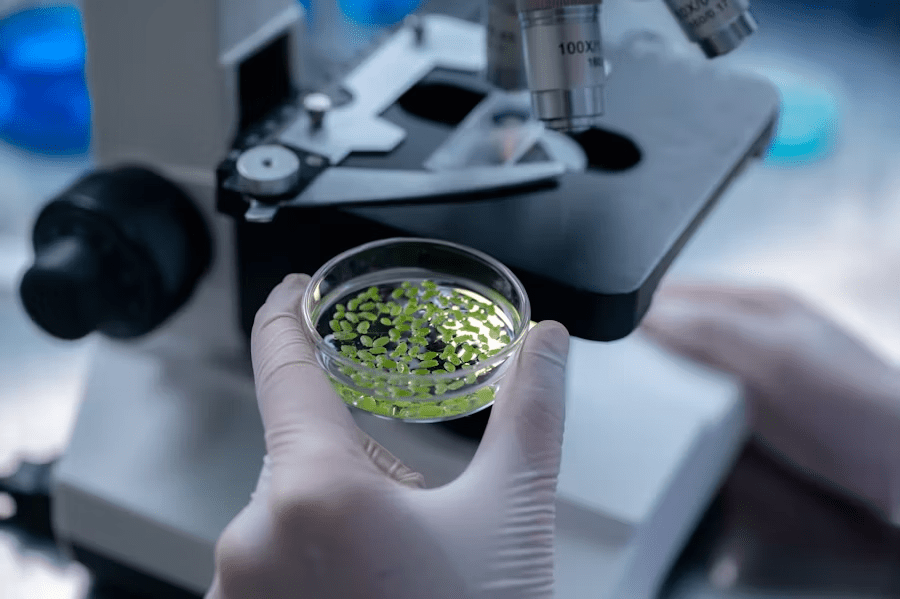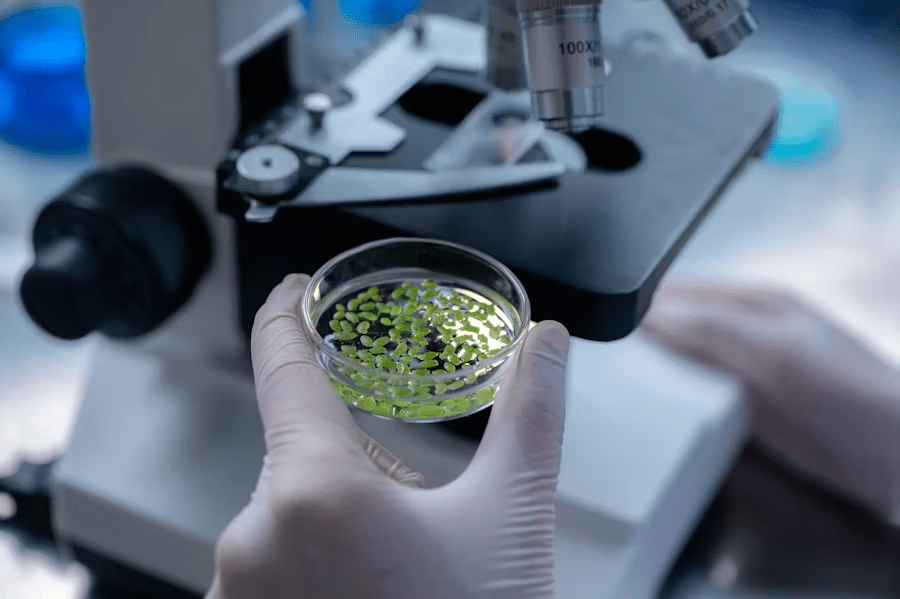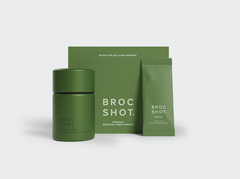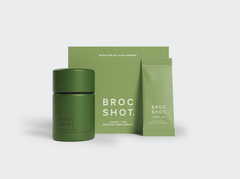Key Takeaways:
- Powerful Natural Compound: Sulforaphane is a well-researched antioxidant shown to support cancer prevention.
- Mechanism Backed By Science: Sulforaphane works by helping to activate detox pathways and reduce oxidative stress.
- Safe And Smart Supplementation: With consistent use, sulforaphane may be a beneficial addition to a wellness plan targeting cancer prevention.
Can something as simple as a broccoli sprout help fight cancer? That question has intrigued scientists for decades. Sulforaphane, a natural compound found in cruciferous vegetables like broccoli, has emerged as a potential ally in the battle against cancer.
At Broc Shot, we harness the full power of this compound with our highly concentrated, bioavailable natural sulforaphane supplement made from whole broccoli seeds. Our mission is to bring you nature-backed support for wellness, disease prevention, and healing.
In this blog post, we explore the science of sulforaphane cancer research, its preventative potential, its potential application as a complementary therapy, and why it’s making waves in both medical and holistic communities.
Note: For those currently undergoing immunotherapy, chemotherapy or radiation therapy, it’s essential to consult with your healthcare provider before adding any supplements to your routine, including sulforaphane. It's important to note that while sulforaphane is well-documented for its role in cancer prevention and treatment, it can potentially interact with certain chemotherapies. Sulforaphane may recognize them as an aggressor in the body and potentially reduce their effectiveness.
What Is Sulforaphane?
Sulforaphane is a phytochemical compound most abundantly found in cruciferous vegetables. It’s formed when the plant enzyme myrosinase interacts with glucoraphanin—especially when broccoli is chopped or chewed. This compound has been extensively studied for its detoxifying, anti-inflammatory, and anti-cancer potential.
You’ll find sulforaphane in many cruciferous vegetables, but Broc Shot’s broccoli powder, made from whole broccoli seeds, and fresh broccoli sprouts deliver the highest potency. Broc Shot captures these benefits in a ready-to-consume format for everyday use.
The Link Between Sulforaphane And Cancer Prevention
How might sulforaphane help prevent cancer? Sulforaphane has multiple biological mechanisms:
- Activates phase II detoxification enzymes that can help neutralize carcinogens
- Helps reduce oxidative stress and minimize inflammation
- Promotes apoptosis (programmed death) in damaged or cancerous cells
Current research shows that sulforaphane may inhibit cancer cell growth in organs like the breast, prostate, lungs, and colon. Its antioxidant-rich nature makes it a potent protector against environmental toxins and internal cellular damage. You can read more about the connection in our post on antioxidants and cancer.
Sulforaphane In Cancer Therapy: What The Research Shows
Beyond prevention, sulforaphane is being investigated as a complementary therapy alongside conventional cancer treatments. Preliminary clinical trials suggest that sulforaphane may enhance the effectiveness of chemotherapy and radiation by increasing cancer cell sensitivity to those therapies.
Additionally, sulforaphane has demonstrated the ability to reduce tumor growth in some experimental models. While it’s not a replacement for medical treatment, sulforaphane may provide synergistic benefits. Learn more about current findings in our related blog post on broccoli sprouts and cancer.
Sulforaphane’s Unexpected Bonus: Skin Health Benefits
While sulforaphane is gaining attention for its cancer-fighting potential, it also delivers impressive benefits for skin health. This powerful compound helps protect skin cells from oxidative stress and environmental pollutants—two major contributors to aging and inflammation. By supporting detoxification at the cellular level, sulforaphane promotes clearer, brighter, and more resilient skin.
Research has even explored sulforaphane’s potential role in reducing UV-induced skin damage, which may further reduce long-term cancer risks associated with sun exposure. Many users report visible improvements in skin tone and texture when incorporating sulforaphane into their routine. You can learn more in our dedicated article on sulforaphane benefits for skin.
How Sulforaphane Targets Cancer Cells
One of the most fascinating aspects of sulforaphane is its selective effect on cancer cells. Research shows that sulforaphane can induce apoptosis, programmed cell death, in cancerous cells while leaving healthy cells unharmed. This unique trait makes it particularly valuable in therapies aimed at prevention or reducing collateral damage to the body.
Sulforaphane may interfere with the cell cycle in cancerous tissue, helping to limit proliferation and disrupt signals that drive uncontrolled growth. By modulating key gene expressions and epigenetic factors, sulforaphane may help restore balance to cellular function. These mechanisms continue to be a promising focus in oncology research.
Inducing Apoptosis In Cancer Cells
One of sulforaphane’s most promising features is its potential to induce apoptosis, or programmed cell death, specifically in cancer cells. Unlike traditional therapies that may harm healthy cells, sulforaphane appears to selectively target abnormal cells, promoting their self-destruction. This precision can minimize damage to healthy tissues and may reduce side effects when used alongside conventional cancer treatments.
Inhibiting Cancer Cell Proliferation
Sulforaphane shows potential to disrupt the cell cycle in cancer cells, preventing them from multiplying uncontrollably. It may interfere with key regulatory proteins that cancer cells use to bypass normal cellular checkpoints. This inhibition has demonstrated potential to slow or halt tumor growth and contribute to an overall reduction in tumor aggressiveness.
Modulating Epigenetic Expression
In addition to direct cellular action, sulforaphane influences gene expression through epigenetic modulation. Sulforaphane affects histone deacetylase (HDAC) activity, a process that can silence tumor suppressor genes when left unchecked. By reactivating these protective genes, sulforaphane may help restore cellular balance and support the body’s natural defenses against cancer progression.
Targeting Cancer Stem Cells
Emerging research suggests sulforaphane may also act on cancer stem cells, the cells believed to drive tumor recurrence and resistance. By impairing the self-renewal capabilities of these cells, sulforaphane could help prevent relapse and improve long-term outcomes. While more studies are needed, this is a promising frontier in cancer therapy development.
Sulforaphane And Hormone-Related Cancers
Sulforaphane may be particularly beneficial in preventing or supporting treatment of hormone-sensitive cancers, such as breast and prostate cancer. These types of cancers often involve hormonal signaling pathways that sulforaphane can influence through epigenetic regulation and enzyme modulation. Sulforaphane has been shown to impact estrogen metabolism and suppress androgen receptor activity in lab studies.
Additionally, sulforaphane’s detoxifying effects may help reduce the accumulation of hormone-disrupting chemicals in the body, further lowering cancer risk. While more clinical data is needed, current findings are promising and suggest that sulforaphane could play a role in personalized cancer prevention strategies for hormone-sensitive populations.
Sulforaphane's Anti-Inflammatory Role In Cancer Prevention
Chronic inflammation is a well-known driver of cancer development, and sulforaphane plays a powerful role in combating it. Sulforaphane helps reduce the activity of nuclear factor kappa B (NF-κB), a protein complex that triggers inflammatory pathways. Minimizing inflammation can reduce oxidative stress, DNA damage, and other cancer-promoting conditions.
In studies, sulforaphane has demonstrated anti-inflammatory effects in tissues such as the colon, lungs, and prostate—areas often associated with cancer risk. When used regularly, sulforaphane may help maintain an anti-inflammatory environment that protects against disease over time.
Combining Sulforaphane With Other Antioxidants
Sulforaphane works well on its own, but it can also be a potent partner when combined with other antioxidants. Compounds like vitamin C, vitamin E, and polyphenols may enhance sulforaphane’s effects by supporting complementary detoxification pathways. Together, these nutrients create a robust defense system against oxidative stress.
Using sulforaphane alongside a diet rich in fruits, vegetables, and whole foods ensures you're covering multiple bases of cellular protection. Supplements like broccoli powder or a complete broccoli supplement can simplify this strategy for daily use.
Choosing The Right Sulforaphane Supplement
Not all sulforaphane supplements are created equal. Many sulforaphane supplements lack the enzymatic activation required to convert glucoraphanin into active sulforaphane. Broc Shot solves this problem by using whole broccoli seeds to preserve the full spectrum of nutrients that form active, natural sulforaphane. Each Broc Shot sachet guarantees 12+mg natural sulforaphane.
When choosing a supplement, look for high-quality sourcing, bioavailability, and transparency in formulation. A reliable sulforaphane supplement should deliver measurable benefits and undergo third-party testing.
Safe And Effective Use Of Sulforaphane For Cancer Support
Using sulforaphane for cancer prevention or complementary therapy requires a high-quality source. Broc Shot’s sulforaphane supplement is milled from highest-quality whole broccoli seeds and sealed for freshness, preserving the integrity of the active compounds.
Incorporating a broccoli supplement into your daily routine is easy. You can take it in the morning with meals, and for best results, use it regularly as part of a holistic lifestyle that includes balanced nutrition, movement, and sleep.
The Future Of Sulforaphane In Cancer Research
Sulforaphane’s potential in cancer therapy continues to evolve as new studies highlight its diverse mechanisms of action. Researchers are exploring its impact on gene expression, immune modulation, and its synergy with immunotherapies and chemotherapeutic drugs. These multifaceted roles make it a compelling candidate for integrative oncology approaches.
Clinical trials are now investigating sulforaphane’s effects on specific cancers, including glioblastoma, leukemia, and bladder cancer. As findings accumulate, they may pave the way for sulforaphane-based therapies or combination protocols. The future holds promise not only for sulforaphane’s preventive use, but also for its targeted role in cancer treatment frameworks.
Final Thoughts
Sulforaphane is one of the most compelling natural compounds being studied for its anti-cancer potential. Whether you’re focused on cancer prevention or seeking additional support during treatment, sulforaphane’s antioxidant and cellular-protective mechanisms make it a powerful potential ally.
As research progresses, this broccoli-derived compound continues to bridge the gap between nutrition and medicine. For a safe and effective source, choose Broc Shot’s trusted sulforaphane supplement.
Read also:
- Nutrient-Rich Foods That May Boost Immunity While Undergoing Chemotherapy
- Sulforaphane Benefits for Skin: Natural Support for Radiance And Repair
- How Compounds in Broccoli Sprouts May Support Cancer Defense
Frequently Asked Questions About Sulforaphane And Cancer
Can sulforaphane prevent cancer?
Research suggests sulforaphane may help prevent cancer by neutralizing carcinogens and reducing inflammation. Sulforaphane helps activate detox enzymes that can protect healthy cells from mutations. Regular sulforaphane intake through diet or supplementation can support your body’s natural cancer defenses.
Is sulforaphane effective for all types of cancer?
Sulforaphane has shown promise in several cancer types including breast, prostate, and colon cancers. However, its effectiveness can vary based on the type and stage of cancer. Ongoing studies continue to explore its full potential across different forms.
Can sulforaphane be used during chemotherapy?
Some studies suggest sulforaphane may enhance chemotherapy effectiveness by making cancer cells more vulnerable. However, it’s vital to consult with your oncologist before adding any supplements to your cancer treatment plan. Sulforaphane is not a replacement for medical therapy but may offer supportive benefits.
What is the best way to get sulforaphane?
The most potent source is broccoli sprouts, especially when consumed fresh or as part of a high-quality supplement. Cooking broccoli reduces sulforaphane content, which is why broccoli powder or cold-processed supplements are recommended. Broc Shot delivers bioavailable sulforaphane in a convenient powder made from whole broccoli seeds that delivers 12+ mg active, natural sulforaphane in each dose.
How much sulforaphane should I take?
Doses in clinical studies vary, but most supplements range from 10–50 mg of sulforaphane per serving. Always follow the dosage instructions on the label. We recommend starting with a lower dose and closely monitoring how your body responds.
Are there any risks or side effects?
Sulforaphane is generally safe and well-tolerated. In rare cases, it may cause mild digestive upset or interact with medications. Speak with a healthcare provider if you’re undergoing treatment or have specific health concerns.
How quickly can I see results from sulforaphane?
Some users notice benefits like improved energy and digestion within a few weeks of starting sulforaphane supplementation. Consistency is key for seeing measurable changes.
Can I use sulforaphane if I have a family history of cancer?
Yes, sulforaphane is often used as a preventative strategy for individuals with elevated cancer risk. Sulforaphane may help fortify the body’s cancer defenses at the cellular level. Incorporating it into your routine may be especially beneficial in these cases.
Is sulforaphane safe for daily use?
Yes, daily use of sulforaphane is safe for most individuals when taken in recommended amounts. Long-term use has been shown to be beneficial in maintaining antioxidant protection. Always choose high-quality products to ensure safety.
Does sulforaphane support skin health too?
Absolutely, sulforaphane’s benefits extend to skin health by helping to combat oxidative stress and inflammation. This dual role supports both internal wellness and external radiance. Explore more on sulforaphane benefits for skin.
Sources:
- Cao, S., Wang, L., Zhang, Z., Chen, F., Wu, Q., & Li, L. (2018). Sulforaphane-induced metabolomic responses with epigenetic changes in estrogen receptor positive breast cancer cells. FEBS open bio, 8(12), 2022–2034. https://doi.org/10.1002/2211-5463.12543
- Cho, Y., Park, M. N., Choi, M., Upadhyay, T. K., Kang, H. N., Oh, J. M., Min, S., Yang, J. U., Kong, M., Ko, S. G., Rahman, M. A., Harrath, A. H., & Kim, B. (2024). Sulforaphane regulates cell proliferation and induces apoptotic cell death mediated by ROS-cell cycle arrest in pancreatic cancer cells. Frontiers in oncology, 14, 1442737. https://doi.org/10.3389/fonc.2024.1442737
- Yin, Q., Zhang, J., & Li, H. (2025). Sulforaphane in alternative cancer chemotherapy: From bench to bedside. Translational Oncology, 18, Article 100142. https://doi.org/10.1016/j.tranon.2025.100142
- Coutinho, L. L. de L., Junior, T. C. T., & Rangel, M. C. (2023). Sulforaphane: An emergent anti‑cancer stem cell agent. Frontiers in Oncology, 13, Article 1089115. https://doi.org/10.3389/fonc.2023.1089115







